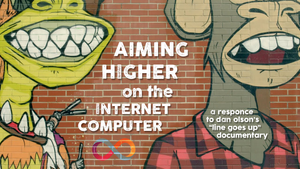For anyone interested in an honest, unfiltered look at the issues facing the crypto, I highly recommend you watch Dan Olson’s new YouTube documentary “Line Goes Up — The Problem With NFTs.” Olson has been one of my favorite YouTubers for years.
His excellent videos on editing, online cooking shows, and flat Earthers all feature mind-bogglingly deep online research, cutting insights, and a genuine understanding of the subject matter he’s digging into. Yes, the video is over two hours long. Yes, it’s worth it.
If you’re deep into the world of cryptocurrency, there’s a chance you’ll find this video hard to watch — perhaps even a bit insulting. The litany of complaints he levies against crypto, the people engaged with it, and what it’s used for is long and detailed.
However, I recommend sticking with it; he doesn’t criticize from a place of anger or cruelty but from a larger concern of wanting things to improve. He wants crypto to have a purpose that is a positive contribution to this world instead of subtracting from it — and I agree.
Over and over again, as I watched him lay out a critical case against crypto, the same two thoughts kept coming to mind: For many of Olson’s technical complaints, the Internet Computer has already solved these problems.
As for the cultural ones — that the crypto community can be deaf to vital criticism and that many current applications and products lack quality, real-world purpose, or relevance — Olson is correct, but there’s an opportunity for the Internet Computer community to lead the way on this as well.
Let’s get into it.
The Internet Computer has already solved this problem!
The Internet Computer fixes many of the core issues with first-generation crypto technology. Some of the big ones Olson highlights that the Internet Computer addresses include:
Electrical Consumption — Olson correctly points out that Bitcoin’s Proof of Work model is redundant, slow, and wastes electricity. IC’s competing model is fast, scalable, and efficient, using less than 1/500th the electricity that Bitcoin requires to write a transaction.
Gas Fees — The cost of a transaction in Ethereum can range from $30-$300 in gas fees, creating a huge barrier to entry and tax on transactions. The Internet Computer has no such fees and instead builds this cost into hosting price, so users don’t shoulder it.
Identity & Anonymity — The Internet Computer’s unique hosting and blockchain implementation combination means that owning crypto isn’t inherently necessary to interact with Internet Computer-based projects.
Instead, the free, built-in Internet Identity tool can be used to log in to social platforms; no crypto is needed. Assets like NFTs generated on the Internet Computer blockchain are also hosted on-chain instead of being farmed out to a Web2 host like AWS.
DAO’s — Olson takes DAOs, Decentralized Autonomous Organizations, to task for being vaporware organizing systems, but the Internet Computer’s implementation of its own governing system, the Network Nervous System, or NNS, isn’t vaporware — it’s in use right now, today, successfully implementing a working digital democracy.
The NNS balances economic incentives with a functional voting system that empowers the Internet Computer to upgrade itself, changing to meet the needs of its community and future-proofing the platform for whatever comes next. What’s more, the forthcoming SNS implementation of this system will extend this utility to Apps hosted on the Internet Computer.
Make Better Art
While the Internet Computer addresses many of the technical concerns and issues Olson raises around crypto’s implementation in the world today, there is a lot that remains to be improved. Some of the issues require a cultural shift within the crypto community at large.
One of Olson's biggest complaints against the NFT space is the quality of the art. Art is subjective, and I don’t want to be too hard on early movers in the space, but I broadly agree: it could be a lot better. It’s early days in the NFT world, especially on the Internet Computer’s nascent NFT platforms, but much (but not all!) of the digital art being created and minted at the moment suffers from the same issues as its ETH-based brethren: it’s ascetically empty, emotionally stunted, cheaply made, and run off the digital printing presses as quickly as possible.
We can and should do better. I want NFTs that make me feel things deep in my bones, NFTs that understand the history of art hanging on gallery and museum walls, but that also embrace the new opportunities that digital production offers. Those opportunities don’t have to be just aesthetic.
One of my favorite projects right now on Ethereum (insert obligatory complaint about gas fees here) is Bored Breakfast Club, an NFT offering that ties into a real-world coffee subscription. Each NFT JPG is designed to be used as a Twitter banner instead of an avatar, innovating the NFT experience while tearing down the walls separating digital and real goods.
I live an “extremely online life” and want art that reflects that experience. NFTs, as an artistic platform, are so new and changing so fast, we don’t know where it’s headed yet — it’s on a path yet to be trodden. So let’s set the right course and create art that does more than take in coins and obsess about floor price.
Let’s embrace the opportunities in digital art and make pieces that tell stories, bring people together, and have an interior life of their own. I imagine tech partnering with artists to create new things of cultural worth. My challenge to NFT artists: Make something great on the platform and blow open the gates of NFTs. Your creativity will be rewarded financially, but focus on the art and human emotion at its core.
Build Utility
It’s not just the artists who need to up their game; it’s the developers too. My challenge to the coders out there in the ICPverse: make Dapps (distributed apps that run on the Internet Computer) that solve real problems, add utility, save money, and help users work more efficiently.
The power of the Internet Computer to host not just blockchain ledger interactions but full-blown Dapps comes with expectations that developers deliver on the promise of what the Internet Computer can be — that they use its rich foundation of tools, speed, and security to create the next generation of Dapps that will draw users into the Internet Computer ecosystem.
The Internet Computer creates the opportunity to make applications with a polished UI and fast interactions that can solve people's problems. This is part of the reason I’m so excited about Catalyze coming to the platform: It’s a real-world application with real uses and real power — no crypto coins needed. Distrikt has created an on-chain social network with an iOS native application frontend.
OpenChat has created a fast, intuitive chatroom system with new daily features. Or, if you are going to build a financial application, make its user interface as buttery smooth as Sonic. The path to Internet Computer success is paved with the applications in the ecosystem and the users they draw in. Developers should strive to create tangible things: no vaporware, no empty promises, no unfulfilled roadmaps.
I look forward to a future where the Internet Computer ecosystem is known for its superior quality of development and for hosting a vast array of applications with a diverse set of users — gamers, influencers, photographers, coders, writers, and day traders, all existing alongside each other, happily reaping the benefits of using the Internet Computer ecosystem.
Gain Some Humility: Crypto as Culture
One topic that Olson dives deep into that I have seen firsthand in the Internet Computer community is “toxic positivity,” where doubt, criticism, and reflection are actively policed and chased out of the community. The “benefit,” as it were, is to create the impression that everything is perfect and everyone is happy, so any newcomer wandering into the chat will see only unabashed excitement and, overwhelmed by FOMO, join the project and community.
While unfortunately effective in the short term, this artificial positivity is toxic to long-term growth, community building, and communication. It’s disconnected from reality and unhealthy for the community members and project leaders alike. Constructive criticism is good. Reflection is good. We want the projects built on the Internet Computer platform to last, not just generate a flash-in-the-pan spike in value.
Critical evaluation and honestly is the only path to get there. We must be able to offer honest feedback without it being reflexively labeled as FUD (fear, uncertainty, doubt). We must identify things we want to be better and work to get there together. That’s what I’m trying to do now.
While I’ve been relieved to find that the Internet Computer’s communities are more open to discussion than many other crypto environments I’ve been in — refreshingly free of bots and yes-men — I have seen attempts to smack down critical debate in favor of unabashed fandom. We can and should do better to raise the quality of conversation.
Helping maintain an engaged community that encourages high-quality work and supports it with critical feedback and enthusiastic discussion will result in the kind of software projects the Internet Computer needs to fulfill its promise. The Internet Computer remade the backbone of the internet into a faster, more secure, blockchain-enabled place.
Crypto is just a tool, reflecting the values and priorities of the communities that engage it. Let’s make the Internet Computer’s communities reflect the thoughtful, clever innovation that launched the Internet Computer — one built on idealism, optimism, and an optimistic view of our blockchain-enabled future.

- Disclaimer: The views and opinions expressed on this website are solely those of the original author and other contributors. These views and opinions do not necessarily represent those of the Dfinity Community staff and/or any/all contributors to this site.


Comments are for members only. Join the conversation by subscribing 👇.